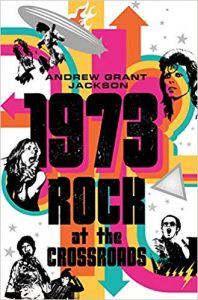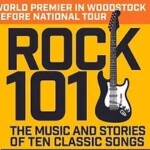1973 was anything but dull, as a maelstrom of socio-political activism, sexual liberation, corruption, scandal and hedonistic excess made it seem as if civilization was either on the brink of collapse or about to undergo an awakening. The war in Vietnam was ending. The oil crisis had plunged the United States into economic despair. Watergate was destroying a presidency. And the bands played on, making classic albums, starting paradigm-shifting movements and putting on unforgettable concerts and festivals, like the Summer Jam at Watkins Glen.
Without getting bogged down in the weeds, author Andrew Grant Jackson relives the epochal musical developments of that year in the colorful, sprawling epic “1973: Rock at the Crossroads.” It reads like a cracking novel, immersed in the cultural and social tumult of the times, as Jackson strolls leisurely through the chaos and minefields to deliver a series of tales of rock ‘n roll glory, transition, conflict and drama without mythologizing any of it. Jackson’s uncanny knack for choosing perfect anecdotes and quotes to capture the significance and poignancy of every momentous occasion carries the day. His ability to make all the puzzle pieces fit into a seamless narrative that flows easily and is still flush with excitement is even more remarkable.
With an assured, uncomplicated storytelling style and keen interest in the subject matter, but also a sort of amused detachment, Jackson covers a lot of ground… days, weeks and months of it. He details how protest soul was swallowed up in disco’s glittery tsunami of dancing fun and how the Southern rock uprising of the Allman Brothers and Lynyrd Skynyrd grew organically, as Jackson’s appreciation of their origin stories and fierce loyalty to their roots is clearly apparent. David Bowie is a central figure in the story, helping with the explosive back-alley birth of Iggy and The Stooges’ unruly Raw Power and teaming with Lou Reed to give Andy Warhol’s transvestite goddesses their due with “Walk on the Wild Side,” after creating his own arty insurgency with Aladdin Sane and then killing off his Ziggy Stardust alter ego, as glam rock lived fast with Alice Cooper and Marc Bolan and died young, setting a fine trashy example for punk. Jackson traces all of this evolution like a modern-day Darwin.
Much is made of Led Zeppelin’s infatuation with reggae and funk and how that informed Houses of the Holy, while the brush with madness that fueled Pink Floyd’s Dark Side of the Moon is explored sympathetically. Jackson portrays outlaw country’s rejection of Nashville fascism as justified and long overdue. The first stirrings of hip-hop in the Bronx with DJ Kool Herc are recounted with a sense of awed respect. The impact of the Jamaican crime film “The Harder They Come” on reggae’s ascent is also studied with academic vigor, as the gradual exchange of the wild creativity and freedom of late-‘60s rock for less dangerous AOR as a more commercial model for mass consumption is scrutinized with critical discernment. Jackson has a sense of fair play after all.
Other characters such as James Brown, Waylon Jennings, Bruce Springsteen, Willie Nelson and singer-songwriter heroes Joni Mitchell, Emmylou Harris, Carly Simon and Billy Joel, among a multitude of others, also play their parts in the pageant. In one scene, there’s the Dolly Parton-Porter Wagoner saga playing out. In another, Iggy Pop crashes and burns. Some of the material in “1973: Rock at the Crossroads” is familiar, some of it is more obscure. Jackson packages everything in a fresh way, with an assortment of essential black-and-white photos to boot. There’s a little something for everyone here.
—Peter Lindblad








Be the first to comment!